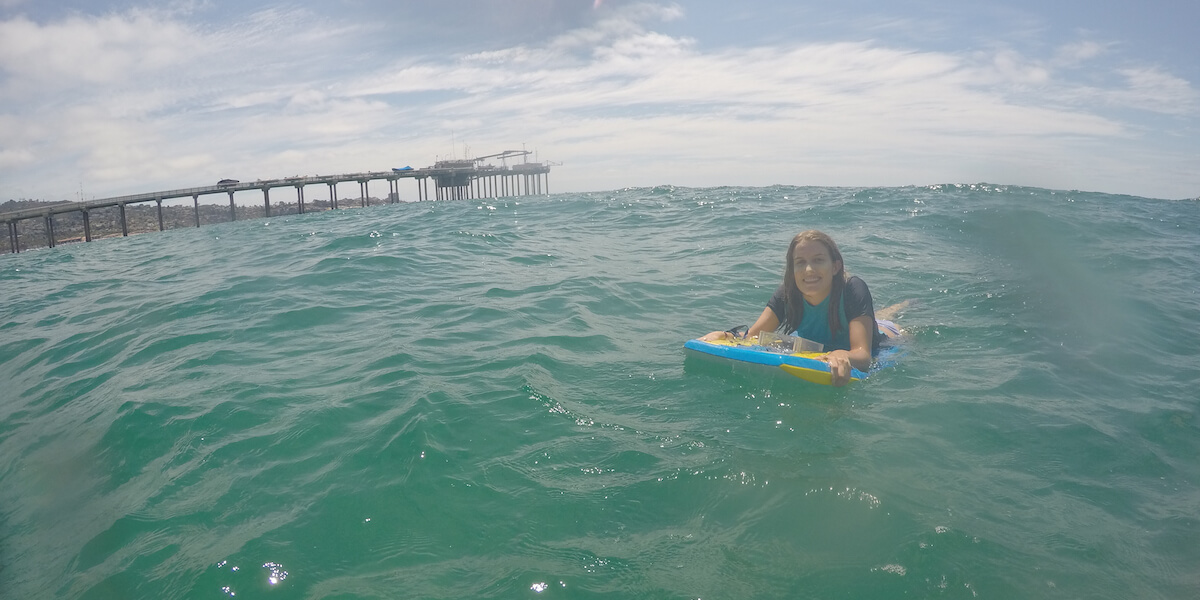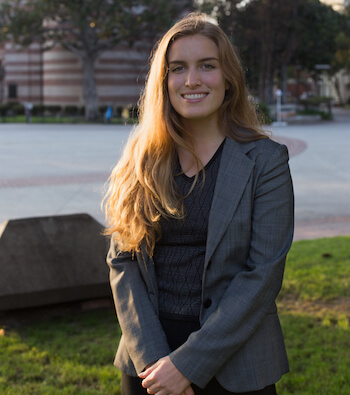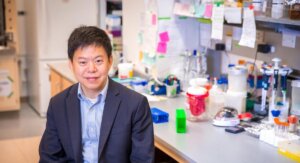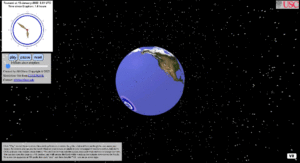
Hannah Walker modified a body board with an embedded waterproof sensor package to collect data about the ocean’s bathymetry. (Photo/Courtesy of Hannah Walker)
Growing up in Del Mar, Hannah Walker remembers spending blissful summers at the beach. She marveled at the ocean’s power and beauty. From her father, an engineer at the Scripps Institution of Oceanography, the future USC Viterbi mechanical engineering major also gained an appreciation of the ocean’s fragility and the need to protect this precious resource.
Years later, Walker figured out a way to combine her love of study with her love for the sea. As a Trojan sophomore, she emailed Professor Patrick Lynett asking if she could become a researcher for him. Lynett, a professor of civil and environmental engineering with an expertise in tsunamis and other coastal processes, accepted her offer. His challenge: create a device that could inexpensively map the ocean’s underwater topography, or bathymetry.
Over the course of a year and a half, Walker researched, tested and developed two such devices, including a second version that attaches to small boat and autonomously maps out nearshore bathymetry. Her work, which could provide scientists with important information about erosion and other coastal changes, greatly impressed Lynett.
“This was PhD-level motivation, and Hannah did it as a sophomore!” he said. “Hannah has that unique combination of great intellect, confidence, creativity, and social intelligence that I have only seen a handful of times in my career.”

Hannah Walker (Photo/Courtesy of Hannah Walker)
Walker’s innovative research also landed the graduating senior the prestigious USC Discovery Scholar Prize, which comes with $10,000. Walker, who has also worked as a researcher for Kelly Sanders – the Dr. Teh Fu Yen Early Career Chair and an associate professor of civil and environmental engineering – said collaborating with professors Lynett and Sanders “gave me opportunities not typically available to undergraduates at other universities. They helped shape my interests and give me a strong foundation in research.”
Walker plans to build on that foundation at the University of California, San Diego, where she will begin a Ph.D. program this fall in mechanical engineering, with an emphasis on fluid dynamics. M.I.T. and the University of Washington also accepted her.
Sanders – for whom Walker helped write MATLAB code that could match residential addresses across two different large and complex datasets, making it possible to conduct a high-impact analysis of the relationship between electricity usage and urban warming – said she expects Walker to shine.
“Given her intellectual gifts, coupled with her energy and passion for learning, I have no doubt Hannah is on the road to being a leading scholar in her field.” Sanders said. “I can’t wait to see what she does with these gifts in the future.”
A dogged, determined undergraduate researcher
In the recent past, Walker has shown herself to be a dogged, determined and resourceful undergraduate researcher.
She contacted Lynett at the beginning of the 2018 spring semester. The professor paired her with a Ph.D. student who taught Walker how to work with the Arduino development platform – a minicomputer that makes it easy for non-specialists to work on engineering projects – and how to solder boards. From there, Walker took over the project to build a low-cost instrument that could acquire coastal data, such as seafloor profiles and wave height fields.
She spent that summer holed up in her father’s garage, which, she said, “looks like a lab because he’s an engineer.” Walker worked with sensors and micro-computers, performing tasks ranging from soldering components to writing hardware control code. After much trial-and error, she embedded a waterproof sensor package inside a body board.
Then Walker personally tested her creation. She paddled her board around the San Diego shore – 100 meters out and then 60 meters in one direction – and collected a large set of bathymetry data. Afterwards, she constructed a 3-D map of the underwater topography of the areas she visited.
Along the way, Walker landed a $5,000 Rose Hills Research Fellowship, two USC Provost Research Fellowships and later took first place in the 2019 International Mechanical Engineering Congress and Exposition (IMECE).
Lynett, as impressed as he was with Walker’s results, encouraged her to develop a more user-friendly instrument – one that didn’t require a person to swim in the surf to gather data.
So, she did.
For her senior deign project, Walker led a team of engineering undergraduates to program a small boat to autonomously gather information of the ocean’s subsurface topography. For $500, the team bought a 2-foot-by-1-foot, remote-controlled boat from Amazon and then modified it. They removed all of the vessel’s electronics and replaced them with a custom-built circuit board attached to a small computer.
After extensive testing, they succeeded in building a low-cost autonomous instrument that could autonomously gather coastal information.
“You drop it in the ocean, turn it on and then it will start moving,” said Walker, who hopes that she or other researchers could one day upgrade the device to make it even more seaworthy and useful to scientists. “You can program it to map as much or as little as you want. If want to only look at a specific area, you could drop it in there. Or you could have it go out a long time and map out a larger area than a human could ever do in the same amount of time.”
Gabi van der Velde-Kraft, a senior majoring in mechanical engineering and president of the Society of Women Engineers, or SWE, worked with Walker on the senior design project. She called Walker a strong leader who “would go above and beyond in making sure our project succeeded, including spending extra time on the project outside of typical working hours and doing additional research.”
A proud Trojan Woman
Walker’s interests extend beyond academic inquiry. As a woman in STEM, she feels strongly about providing opportunities to other women in science and technology. Only by leveraging all of its talents, she said, can society truly reach its potential.
Just as she received encouragement from professors Lynett and Sanders, among others, Walker has served as a mentor in SWE. She has provided guidance, encouragement and emotional support to two younger group members, including Isabel Yarwood Perez, a junior majoring in mechanical engineering. Yarwood Perez said Walker helped her choose classes, teachers and apply for summer internships and research opportunities.
“She’s taken a lot of time to chat with me, even though I know she’s incredibly busy,” Yarwood Perez said. “Hannah’s been super helpful and super friendly with her advice. I know if I reach out to her, she’d always help me.”
Walker said she’s thrilled that USC Viterbi has achieved gender parity, with women comprising 50% of the 2019 entering undergraduate class. As a member of SWE and USC WiSE, or Women in Science and Engineering, Walker said the school of engineering had created a “safe space” for herself and other women at USC Viterbi.
The newly minted graduate looks back fondly at her time at Troy.
“It was very cool being around so many students doing interesting things, whether it was research or belonging to an organization,” Walker said. “They were so passionate.”
Published on May 14th, 2020
Last updated on May 2nd, 2022













